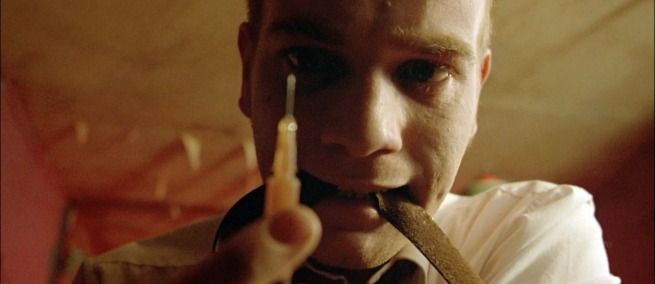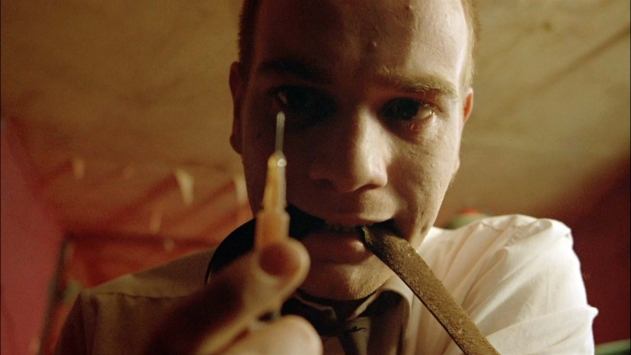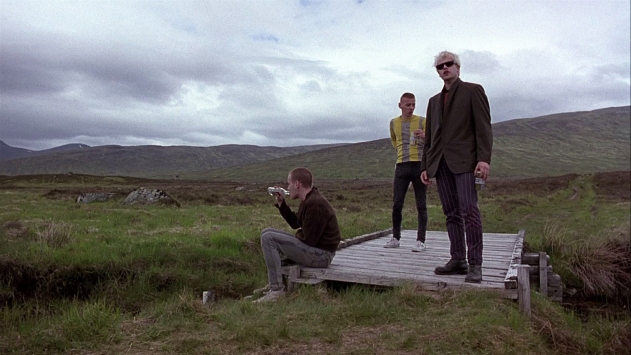
Danny Boyle’s TRAINSPOTTING is a portrait of a group of heroin addicts self-described as the “scum of the earth.” Addiction is a presence in the movie as strong as any character, and it overtakes each one. Since the debut of the film twenty years ago, how has the culture’s perception of addiction changed? Who better to elucidate this than a clinical psychologist who sees patients struggling with addiction on a daily basis. Dr. Kathryn McHugh is at the Division of Alcohol and Drug Abuse at McLean Hospital in Boston, and is an Assistant Professor at Harvard Medical School. In addition to her clinical practice she conducts research funded by the National Institute on Drug Abuse.
On February 29, Dr. McHugh introduced TRAINSPOTTING at the Coolidge Corner Cinema as part of a program to creatively shine a scientific lens on beloved films. Science on Screen is a partnership between the Sloan Foundation and Coolidge Corner to enhance public understanding of science. Science & Film spoke on the phone with Dr. McHugh in advance of her presentation:
Science & Film: It is the 20th anniversary of TRAINSPOTTING, which was made in 1996. Do you think its portrayal of an addict would be done differently if the film were made today?
Kathryn McHugh: The film is certainly an artist’s rendering. The thing to keep in mind with substance use disorders is that they’re really heterogeneous—there are certainly common themes but it can look a lot of different ways. One of the issues in the language of addiction is that there have been stereotypes of what someone looks like when they are abusing heroin , or alcohol, or nicotine. All that being said, the film does a spectacular job of portraying a number of elements of opiate use disorder.

S&F: What did you think of the fantastical components of the film?
KM: I thought it was a neat way to depict something that is really hard to depict. You are talking about something that is in somebody’s head which is a subjective experience—how somebody experiences opiate withdrawal, which is an awful physical and psychological process. Again, it is a bit of an artist’s rendering.
S&F: There is the famous line in the movie where Ewan McGregor says, “we are the scum of the earth.” You are seeing patients who are struggling with addiction, what sort of self-image do they have?
KM: There are a couple different elements to that, with the caveat that we’re talking about a ton of heterogeneity. Within this particular depiction you can see two things you find a lot clinically: self-criticism and social group identification. With self-criticism you hear, “we are the scum of the earth,” and there is another line towards the end where he says, “I am a bad guy.” So you can see that self-loathing and self-criticism. People who are struggling say something that they hear from other people, “why can’t I just do this?” They are befuddled by the fact that they can’t make this change. People get very frustrated with themselves and self-loathing is a huge piece of the puzzle. But the other piece you can sometimes get—and I think this is really difficult for the recovery process—is almost a sense of identification with the drug culture. You see this really nicely depicted in TRAINSPOTTING. There is a social group where drugs draw them together, and when they start to get sober the group breaks apart, and then they come back together around the drug. During the recovery process people are often losing some of their closest social connections. Also, people can be good at that culture: knowing where to get drugs and how to buy drugs. That takes a certain skill set and people can feel effective in that. When they then try to translate that and leave that behind to get a 9 to 5 job and live a normal life, they feel like a fish out of water.

S&F: That’s interesting because in the movie Ewan McGregor gets a job buying and selling real estate.
KM: Yes, it pulls on that same kind of skill set.
S&F: What support do most people need to kick their addiction? In the film his parents take him out of the rehabilitation system and lock him in his room.
KM: One thing that is depicted nicely is that yes, it absolutely takes a lot of social support. The thing that I think is hard for people to wrap their minds around about this is that you don’t make the decision once that you are going to stop using; you are making that decision every day, you are making that decision multiple times a day. In the movie, the friends pop back up and it takes so little for him to get pulled back in.
S&F: Do you see patients over a long period of time?
KM: Yeah, it can depend on the person and the severity level. There are some people for whom relatively short treatment is enough and they have good social support, and maybe they do some self-help. Sometimes there are people who really do need to stay connected to treatment long-term. One thing that the National Institute on Drug Abuse is starting to talk about more and more is the idea that in some cases a good analogy for substance abuse disorder is something like diabetes, which is something that really requires ongoing care; it’s not something that you treat and it goes away and never comes back again. For a lot of people you really do see them long-term in some capacity or another.
Dr. McHugh presented at the Coolidge Corner Theatre before the screening of TRAINSPOTTING. Her introduction is available to stream below.
CONTAGION will be Coolidge’s next Science on Screen program, preceded by an introduction by the Sloan-supported geneticist George Church on March 22. That evening is the National Science on Screen event which takes place once a year; cinemas across the country with Science on Screen programs will simultaneously host a Science on Screen evening.
PARTNERS
TOPICS